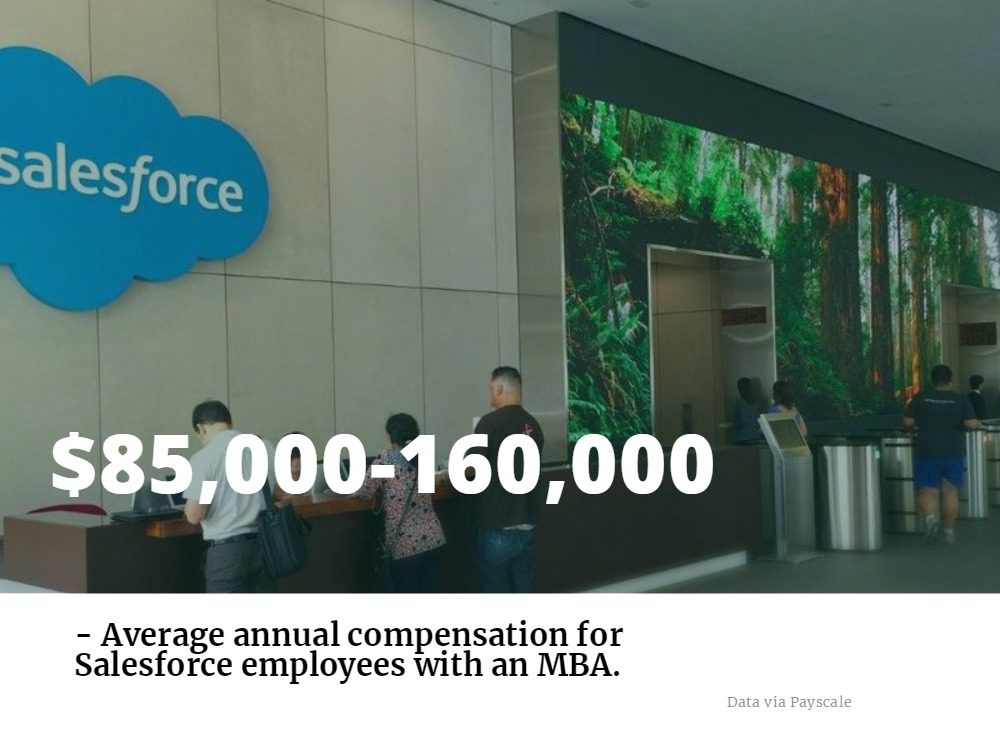How Online MBAs Use Technology to Enable Authentic Connections

Sponsored Content
Technology has dramatically blurred the line between the digital and offline worlds; we can do almost anything online these days, ranging from ordering groceries to exploring Africa to attending college. However, one of the points of debate across nearly all fields is how the online experience compares to the parallel offline one; this has been especially true in online degree programs: Can online degrees provide the same value as their face-to-face counterparts?
The challenge of engaging and preparing students is two-fold for online degree programs. They need to cover the same key topics and transfer the same volume of knowledge as their on-ground counterparts. However, another part of the attraction of top MBA programs is that they not only develop students’ business acumen, they facilitate long-lasting connections that can lead to career opportunities and professional connections. That level of engagement presents a much bigger obstacle than catching someone’s attention long enough to complete a simple e-commerce transaction.
Technology in the Online Classroom: Two Major Lessons Learned
One of the things that makes a great online MBA successful is technology. Of course, if it were just an issue of investing in the latest and greatest tech solutions, every university would have successful digital learning programs. Further complicating things is the boom in technology built to solve this problem; which solution is best for the online classroom, and which will help build skills that will carry over into students’ careers.

After looking at some of the technology decisions at the University of Southern California’s Online MBA program, we found two major lessons for how to be successful with the kind of engagement these programs need to facilitate.
1. Innovate With Purpose
It’s easy to see the concerns over rapid technology evolution, whether you consider this 2015 New York Times article about innovation happening too quickly for businesses to keep up, or William Smith’s Morley, in which he wrote that widely available news and faster travel options would destroy relaxation as we know it, in 1886.
The technology we use will always be changing, whether it’s 1886 or 2186. One of the things that is hard to admit, though, is that the thinkers who said it would be impossible to keep up were right. Particularly at an organizational level, it really is impossible to stay current with every technology innovation that emerges.
The difference between success and failure—in the virtual classroom and in global business—is how they adapt new technologies to their environments.
One example of this in action comes from the University of Southern California’s Online MBA program. There are countless options for encouraging deeper collaboration and facilitating connections in an online setting, including a growing list of business collaboration tools as well as universities who opt to build their own social collaboration platforms. Sometimes, though, the answer is much simpler.
One of the things that stood out from USC’s Online MBA is that, in addition to the classroom sessions and videoconferencing, students chat and connect over WhatsApp. One of the biggest lessons from this experience is the fact that, sometimes, the best solution for a given problem is something students or employees are already using; it just needs to be embraced in a way that supports desired outcomes.
Why it Matters: Both businesses and universities may be reticent to allow important work and collaboration to exist outside of the platforms they control; and, there are certain instances (i.e. regulation) where allowing consumer-grade technology is a poor choice. However, embracing a student or employee-driven approach to collaboration is essential to making it work, particularly in a virtual setting. Rather than try to force students off the tool they’re comfortably using, USC can focus on smarter investments in other areas that are critical to online learning, like high quality video conferencing and learning management systems.
2. Outcomes First, Technology Second
It may seem counterintuitive at first, but the best strategies for utilizing technology don’t start by considering technology—they start by considering desired outcomes. If the goal is to facilitate the creation of real connections in a virtual space, using technology to enable this will need to feel natural and incorporate features that bring some of the same qualities of face-to-face interaction.
For online MBAs, there is a second and critical part to solving this challenge: Increasing students’ familiarity with tools that they will need to use in their professional lives.

For both businesses and higher education institutions, approaching this problem primarily from a technology perspective is the wrong approach. By thinking about desired outcomes, organizations can better guide their technology choices.
For example, with software for videoconferencing, there are myriad options. From a purely technical standpoint, many schools might first consider a solution like Blackboard Collaborate or Canvas’ built-in conference tools because so many already have Blackboard or Canvas for their Learning Management Systems.
These platforms may be enough from a functional standpoint, but, for developing true connections in an online MBA, user experience is an even more critical element of software used for video and teleconferencing. Considerations like these led USC’s Online MBA program to leverage Zoom, a dedicated communications platform, for conferencing in addition to the Canvas LMS for facilitating learning. Zoom lets students see the instructor, as well as their fellow classmates on live video, making it closer to face-to-face interaction than many alternatives. It’s also easier to schedule meetings on short notice with the ability to send calendar invites, offering similarity to the spontaneous brainstorming sessions that might happen in a classroom or office.
Why it Matters: The best solution for a given problem isn’t always the one that comes integrated with the rest of the software organizations already have. Especially for an online MBA, it’s also important to consider technology that has value beyond the classroom, as this will better equip students to succeed in their careers. The second component of this is to think about software that readily integrates with platforms people use in their daily lives anyway. Even if it is just the ability to send a meeting invite over Google Calendar, individual features can make the difference.
The Results: When Technology is Used Effectively
The biggest result of USC’s smart use of technology is that students can and do form real connections that lead to face-to-face interaction. For example, many students organize meet-ups in their area, so that those who live away from campus can still participate in the Online MBA community.
The deeper social connections, coupled with classroom learning and group discussions, also create unique opportunities that would not be as easily made without digital engagement. In USC’s case, one team of students in the recent cohort is planning to open their own business together.
The Bottom Line: Universities have historically struggled to keep pace with technology adoption. Regardless of whether a program is online, offered on-campus or uses a hybrid approach, though, the best MBA programs will stay ahead of the curve by considering outcomes first and avoiding the temptation to innovate without a clear purpose.
To learn more about the USC Marshall School of Business Online MBA, visit the Marshall website.
5 Highest Paying MBA Internships in Philadelphia

The moment you decide to earn your MBA, you should already be thinking about your MBA internship. Within the first few months of your education, you’ll be discussing your internship opportunities and soon afterward, applying. For the most part, you’ll choose your internship based on your career interests, but there’s one other aspect to consider: the pay.
MBA interns can earn impressive hourly wages, which may be a shock if you’re still thinking like an undergraduate student who worked an entire summer for free. But is an MBA internship salary something to sneeze at? It could be depending on your job function, industry, and the company you work for. So, who pays the most?
We dug into Philadelphia MBA internships to find out which companies would pay the most, and here’s what we discovered. Continue reading…
Best MBA Internship Opportunities in the Northeast

There’s no doubt that summer internships play a critical role in an MBA student’s education and career. Not only do internships provide students with the opportunity to gain hands-on experience in the workforce, but they’re also known for helping students develop professional connections and earn top-tier salaries.
But not all internships are made equal, especially for talented business school prospects. For example, working at Apple would likely have a very different effect on an MBA’s resume than working for a small, unknown startup company down the street. And if you’re looking at the top cities across the U.S. where companies actively recruit talent, you can’t go wrong with Boston, New York City, or Philadelphia for your location. But which is the best?
In this article, we highlight the top internship destinations in each city along with the top two schools in each area that will get you where you want. Continue reading…
The Future of Employment at Philly Business Schools

When considering where to get your MBA, one of the first questions you should ask is, “What will my employment outlook be?” After all, the reason you get an MBA is to improve your career. But what is important when it comes to employment trends at the leading business schools in Philadelphia? There are quite a few different statistics you should look at.
Important MBA Employment Statistics
To choose an MBA program based on your future career success, there are a few questions you need to answer.
- What industry do I want to work in and does the school place a majority of their students in that industry?
- What percentage of students receive and accept job offers? The same for internships?
- Self-employed or entrepreneurship data?
- What salary can I expect?
- Where do most students end up living and work?
- Who are the top employers?
You also want to look at any trends between years. For example, the percentage of students receiving job offers should increase year-over-year. And if you see a shift from the consulting industry to financial services, you want to be aware that the school could be changing its direction.
So, what does employment look like for three of the top Philly business schools?
The Wharton School
At the Wharton School at the University of Pennsylvania, the employment trends year-over-year are fairly consistent. While the percentage of students reporting job offers dropped from 2016 to 2017, part of that reason may be the increased number of students seeking employment (75.2 percent vs. 79.1 percent).
As for the increase in median salary, that can be attributed to inflation as well as an increase in job salary for each industry including professional services rising from $160,000 in 2016 to $180,000 in 2017. The location of jobs also changed slightly between 2016 and 2017, but that could be due to various reasons including the current state of international affairs for the U.S.
| The Wharton School | 2017 | 2016 |
|---|---|---|
| Percentage of students reporting job offers | 97.1 percent | 98.3 percent |
| Percentage of self-employed students or those starting their own business | 4.8 percent | 5.8 percent |
| Median Salary | $130,000 | $125,000 |
| Location Choices | 88.7 percent U.S. 11.3 percent International | 86.9 percent U.S. 13.1 percent International |
As for where MBA students at the Wharton School gain employment, there are a few important notes. The same top three industries—financial services, consulting, and technology—attracted students in both 2016 and 2017. However, the percentages were a little more evenly distributed in 2017. As for the companies hiring students, most of the same companies showed up each year.
| Top Three Industries | Percentage of Students (2017) | Percentage of Students (2016) | Companies Employing Two or More Students (2017) |
|---|---|---|---|
| Financial Services | 32.7 percent | 35.1 percent | Barclays, CITI, and HSBC |
| Consulting | 28.3 percent | 26.6 percent | A.T. Kearney, McKinsey & Company, and Boston Consulting Group |
| Technology | 16 percent | 12.6 percent | Adobe Systems, Amazon, and IBM |
Penn State Smeal College of Business
Pen State’s Smeal College of Business is consistent year-over-year in regards to its MBA employment trends. The percentage of student reporting and accepting job offers increased between 2016 and 2017 from 88.9 percent to 91.5 percent. However, the median salary stayed consistent at $105,000, and the hiring trend of most MBA students staying in the U.S. also remained the same.
| Penn State Smeal College of Business | 2017 | 2016 |
|---|---|---|
| Percentage of Students Reporting Job Offers | 91.5 percent | 88.9 percent |
| Median Salary | $105,000 | $105,000 |
| Location(s) | 98 percent U.S. 2 percent International | 96.5 percent U.S. 3.5 percent International |
As for where MBA students at Smeal College gain employment, there are a few important notes. While the same industries made the top four each year, where they placed changed. In 2016, the top industry was consulting (25 percent) while that changed to manufacturing in 2017 (20 percent). In 2017, retail also moved into tie consulting for the second most sought-after industry, while technology actually decreased year-over-year (23 percent vs. 15 percent).
| Top Four Industries | Percentage of Students (2017) | Percentage of Students (2016) | Companies Hiring |
|---|---|---|---|
| Consutling | 18.5 percent | 25 percent | Deloitte, EY, and PricewaterhouseCoopers |
| Technology | 15 percent | 23 percent | Amazon, Apple, and Dell |
| Manufacturing | 20 percent | 14 percent | Amphenol Corp, CHEP, International Inc. |
| Retail | 18.5 percent | 14 percent | Anheuser-Busch, Proctor & Gamble, and Johnson & Johnson |
Rutgers Business School, Camden
In 2017, the Financial Times ranked the Rutgers MBA as the best program for MBA employment across Big 10 schools. In 2016, Bloomberg Businessweek also ranked Rutgers as the best MBA program for job placement in the U.S. This indicates a relatively steady year-over-year employment trend for MBA students.
As for the median salary of a Rutgers MBA, students in 2017 could expect to earn $95,680. As for the most popular industries, they were:
- Pharmaceutical/Biotech/Healthcare: 46 percent
- Consulting: 13 percent
- Consumer Products: 13 percent
- Other: 14 percent
How Can You Score a Job at Salesforce with an MBA?

Salesforce, one of the country’s highest valued cloud computing companies, is actively looking for promising MBA graduates, offering diverse opportunities in tech, business, and sales. Since it’s founding in 1999, Salesforce has been growing wildly, becoming the first enterprise cloud company tor each $10 billion in revenue as of August 2017. And Salesforce isn’t just remarkable for its product’s success—the company was also rated as the “#1 Best Company to Work For” by Fortune.
The Salesforce culture is centered around the idea of “Ohana” (Hawaiian for “family”), and earned its place at the top of the list by offering incredible benefits to its employees—both monetary and mentally. It’s understandable why MBA’s would want a job at Salesforce Ohana, with their focus on helping strong performers find new challenges and opportunities for growth.
What Does Salesforce Look for in New Hires?
Salesforce makes recruiting a priority at every level through their Futureforce University recruitment program. Salesforce offers new hires the same incredible opportunities available to all of their employees—seven days of paid time for volunteering, networking opportunities, and access to the Executive Lunch & Learn and Speaker Series that puts interns and new hires in direct contact with Salesforce leadership.
Because of Salesforce’s focus on having their employees give back to their communities, they seek out new hires who have made a demonstrated impact within their past efforts, whether at school or professionally. In 2015, Salesforce’s senior vice president of global recruiting, Ana Recio, commented on the different ways applicants could make themselves stand out.
“What did you do to differentiate your job from others?'” she said. “What was your absolute impact, your legacy? We always look for people who truly were kind of thought leaders and change agents.”
How to Get Your Foot in the Door?
MBA graduates and current students can apply directly for open roles. Current students will most directly benefit from the company’s MBA internship: a 12-week program that students can pursue during the summer in between years one and two of their program. Each summer, MBA interns are hired in the fields of product marketing, product management, CSG business analyst, corporate development, and data analytics. If recruiters think there might be a good fit, applicants will likely be given a 30-60 minute phone screening, followed by an interview with a hiring manager. Before offering the position, MBAs will likely have to partake in a panel interview/case study, presenting their professional and academic accomplishments.
Salesforce also recruits recent graduates (those who graduated in the last 12 months) in the fields of tech, sales, and business. The precise roles and interview process for each varies depending on the field.
How Well Does a Job at Salesforce Pay?
The majority of hires at Salesforce, both full-time and interns, are for tech-centric positions. However, the company does offer supreme compensation for those with business degree backgrounds—especially those with an MBA.
According to Payscale data, MBA graduates wit a job at Salesforce earn between $85,000 and $160,000 USD annually.

It’s no secret that one of the reasons Salesforce tops the Glassdoor list of “Best Places to Work” is the compensation. Although, as with any position, salary will vary depending on a number of factors, Glassdoor’s compensation of full-time employees shows a lower-end salary range of $60,000-80,000 annually (for account executives and sales engineers) and upwards of $141,000 for senior engineer positions.
What Do Current and Former Salesforce Interns Think?
Danielle, who interned with Salesforce as a product marketing MBA intern, commented on her work experience and Salesforce’s company culture in this video. “Not only am I working on independent projects as part of the internship, but I’m also shadowing people in my team and really seeing what a true day in the life is for a project manager within the app cloud,” Danielle said. “Other internships are very focused on their projects and feel very siloed but here at Salesforce I’m really able to be integrated with the team as a whole.”
Eamon, a software engineer who began at Salesforce as a recent graduate, also commented on his experience. “As a new grad what’s interesting is there really is no pathway you’re supposed to follow, it’s what you make of it,” he said. “It’s the people you go out of your way to meet, the experiences you make, the projects you decide to take on.”
Tech Grads Surge in New Northwestern Kellogg Employment Report

The Kellogg School of Management released new employment data and statistics from the Class of 2017. According to the school, 94 percent of Kellogg’s full-time MBA Class of 2017 received an offer within three months of graduation.
“Kellogg leaders take a multidisciplinary approach to solving complex business challenges,” said Matt Merrick, Associate Dean of MBA Operations. “The versatile skills they hone at Kellogg enable them to make an immediate impact across all types of organizations.”
MBAs were hired by a wide variety of companies across all disciplines and industries, shapes and sizes. Some of the top companies hiring Kellogg students include McKinsey & Company, The Boston Consulting Group, Amazon, Bain & Company, and Microsoft.
Employment data shows that the most popular industries were consulting (33 percent), technology (25 percent), finance (13 percent) and CPG (12 percent). The Kellogg Career Management Center helped students establish relationships with more than 50 technology companies in order to help secure these employment opportunities. Overall, the Career Management Center works with employers to create custom recruiting strategies, forging deep relationships with employers of all sizes, from all industries and regions.
According to our sister site Clear Admit, the 25 percent of Kellogg grads that landed jobs in the technology industry was a school record.
Jeanette Brown writes:
“Amazon hired 32 Kellogg grads, making it the third largest recruiter in 2017, behind only McKinsey and Boston Consulting Group (BCG). But Amazon was far from the only tech firm to hire at the school. ‘It’s not only the big employers like Amazon, Apple, Google—but the small companies as well, the ones that hire just one to two MBAs,’ explains Liza Kirkpatrick, Senior Director of the full-time MBA program at Kellogg’s Career Management Center. ‘We had over 50 unique tech employers that hired our students this past year, which demonstrates that we really have that depth.’ Kirkpatrick further noted that the types of jobs for which tech firms are hiring Kellogg grads is widely varied, including product management, sales, marketing, business operations, supply chain, product development, and others.”
Kirkpatrick notes that the surge in tech jobs stems from a concerted effort from the business school, which was also reflected in the number of technology industry internships for the Class of 2018.
“‘We started developing relationships in the tech space many years ago,’ acknowledges Kirkpatrick. ‘It has taken a while for firms to recognize that when an MBA comes on board, it really adds value.’ But they certainly have, which can also be seen reflected in the number of tech firms that now take on summer interns. ‘They have really organized themselves to bring on an MBA class as interns as a result,’ Kirkpatrick adds. The most recent employment report reveals that 26 percent of the Class of 2018 interned at technology firms.”
In a press release from the school, Jodi Washington, a Program Manager for the Networking and Security Transformation team, said, “Kellogg’s curriculum builds leaders who are strong analytical thinkers and are confident collaborating across organizations. The Kellogg graduates we hire jump in on day one, but also continue to mature at Cisco.”

2017 statistics/photo courtesy of Northwestern Kellogg.
The statistics show that the number of Kellogg MBAs to accept job offers on the West Coast has also increased (31.4 percent) from last year, a direct correlation to uptick in tech hires. Meanwhile, 30 percent of 2017 MBAs stayed in the Midwest and 33 percent accepted jobs on the East Coast.
You can read more on Kellogg’s latest employment stats and the Clear Admit interview with Kellogg Senior Director of Career Management Liza Kirkpatrick here.
